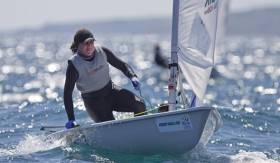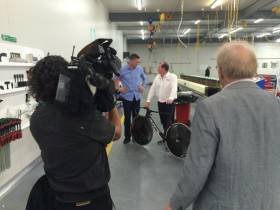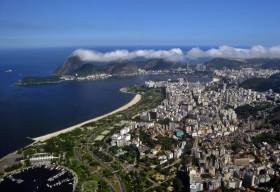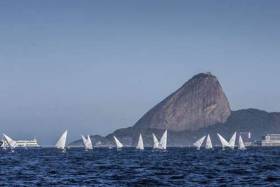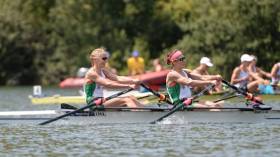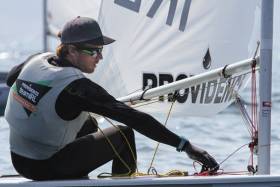Displaying items by tag: Rio 2016
Olympics 'Medal Moments' Marketed To RTÉ Advertisers
#Rio2016 - Tailored advertising spots to capture the spirit of success at next month's Olympics are now being offered by Ireland's national broadcaster.
According to The Irish Times, these branded "bespoke congratulatory messages" will feature in commercial breaks following any Irish medal win at Rio 2016.
In its pitch to prospective big-brand advertisers, RTÉ Media Sales have singled out sailors Annalise Murphy, Ryan Seaton and Matt McGovern as potential winners on the world's biggest sporting stage.
The Irish Times has more on the story HERE.
#VOR - A world-leading carbon fibre specialist and supplier of masts and rigging to the Volvo Ocean Race fleet has taken a spin at supplying wheels to New Zealand's Olympic cycling team.
Auckland-based Southern Spars is already a long-time supplier to Team New Zealand as it has been to the VOR, but this marks the first time they've developed technology for sporting use off the water.
“The collaboration with Cycling New Zealand has been about taking [our] expertise and applying it in a different context - working together to create a significant performance benefit," said Southern Spars director Mark Hauser.
“We have drawn on our years of experience in the design and manufacture of carbon fibre technology and components. This has led to high performance in yachting, as well as specialist knowledge of windage, stiffness, and strength.
"In doing this, we have designed a new, superior wheel, which we’re delighted to be supplying to the New Zealand track cyclists.
Hauser said he and the Souther Spars team are "very excited by the potential of the new wheels" which will have their first major showing on an international stage at the Rio games this August.
Crime Threat To Olympic Athletes As Rio Games Draw Near
#Rio2016 - “I don’t think the Irish media know how bad it is over here in Rio…” So Ireland’s Paralympian John Twomey emailed early this morning, as Afloat.ie's Tom MacSweeney writes.
He was reporting how “two good friends of mine who were in Kinsale for the Para Sailing Worlds in Kinsale in 2013” had been held up by two men, one of whom had a pistol, close to their hotel in Rio on Sunday morning. The Australian Sailing and Paralympic Committees have been told of the incident.
Liesl Tesch and team official Sarah Ross were confronted by two men while riding their bikes in a park near their hotel. One of the men was carrying a pistol and while both were threatened, the bikes were the only property stolen during the incident. Both members were unharmed, but shaken, and took part in racing at the 2016 Paralympic Games sailing venue later in the day.
“We were returning from a morning ride when the incident took place,” said Tesch. “We were close to our hotel when we were confronted by two men, one of whom was armed. I was threatened with the pistol and pushed to the ground.
“He took my bike, and the other perpetrator took Sarah’s bike. We are both shaken, but physically we’re both OK.”
Twomey commented: “These two ladies are good friends of mine and were in Kinsale for the Para Sailing Worlds in Kinsale in 2013. I don't think the Irish media know how bad it is over here in Rio. Perhaps you might keep people informed.”
Sailing teams and other athletes are gathering in Rio for final weeks of training and practice before the Olympics and Paralympics – and if they avoid any similar or even more serious brushes with criminal elements, they may be very lucky indeed.
The Sailing Anarchy website reports another incident when two Team GBR RIBs were stolen from Torben Grael’s Rio Yacht Club in Niteroi, which is reported to have been hit by stray bullets from a nearby gunfight in previous weeks.
Two British team coaches found the RIBs on a beach beach in Jurujuba, not far from the US team’s launching location.
Sailing Anarchy reports: “[The boats were found] as they were being stripped. Already VHFs, fuel hoses, tanks, and wiring were already gone, with outboards next to go. The GBR coaches immediate reaction was to threaten the thieves with calling the police. ‘You think that will help you?’ the head pirate said...
"One of the coaches surreptitiously snapped a pic of the pirates and the Rio Yacht Club staff identified one of them as a top drug dealer in the nearby Jurujuba favela, and told the coach he was very, very lucky.”
#Rio2016 - Calls from scientists to move this summer's Olympic Games in Rio over the outbreak of the Zika virus have been dismissed by the WHO, as BBC News reports.
As many as 150 international scientists and medical experts put their names to an open letter that claims the latest findings on the virus mean staging the event as-is would be "unethical".
The letter cites the failure of a programme by Brazilian authorities to control mosquitos that carry the virus, which has been linked to serious birth defects, as well as the country's "weakened" healthcare system as the outbreak spreads in South America, as reasons why hosting the games poses "an unnecessary risk" to the thousands of athletes and tourists set to arrive in Brazil two months from now.
However, the WHO – which has declared Zika as a worldwide health emergency – says moving or postponing Rio 2016 would "not significantly alter" the spread of the virus.
It's a stance supported by the head of the US Centers for Disease Control, Dr Tim Frieden, who said there is "no public health reason" to move the games – in the same week that the final on-site review of Olympic venue preparations took place.
Earlier this year it was reported that female athletes preparing for the Rio Olympics were advised to consider the risks involved before travelling to compete.
BBC News has more on the story HERE.
Rowers In Team Ireland's First Selections For Rio 2016
#Rio2016 - Four rowers have been included in Team Ireland's first formal selections for this summer's Olympic Games in Rio.
Sinead Lynch and Claire Lambe in the lightweight women's double scull and the team of Paul and Gary O'Donovan in the lightweight men's double scull were put forward by Rowing Ireland in the first group of selected athletes for Rio 2016 announced on Friday 20 May.
"The athletes selected have fantastic potential and have shown that they are capable of performing against the very best in the world," said Kevin Kilty, Team Ireland's chef de mission for Rio 2016.
"We will provide them with the best possible high performance environment in Rio in order that they can perform at their best.”
The four rowers join two badminton hopefuls, two gymnasts and a six-strong boxing contingent – including Olympic medallist Paddy Barnes – in the first team announcement.
#Rio2016 - Rio's water 'will be ready' for sailors when the Olympic Games begin in August, according to China's Xinhua News Agency.
Speaking at an event to mark the lighting of the Olympic torch in Athens on Thursday (21 April), International Olympic Committee president (IOC) Thomas Bach told the media: "We are very confident that the competition area for the athletes will offer safe and fair conditions.
"The city, the state and the organising committee are undertaking many efforts and what we see now is that 60% of the surface is clean," he added. "Without the Games it would be zero."
However, Bach made no reference to concerns over viral contamination of the notoriously polluted Guanabara Bay, nor the risk posed to female sailors by the spread of the Zika virus.
Espey Backs 'Flow' Campaign For Watersports In Northern Ireland
#JamesEspey - Olympic Laser hopeful James Espey made time in his busy Rio 2016 training schedule for to help launch a new campaiign aimed at getting people involved in watersports, according to the News Letter.
As previously reported on Afloat.ie, the Flow campaign is a partnership between SportNI and various sporting bodies that's encouraging water-based activities in the run up to September's European Week of Sport.
Watersports clubs around Northern Ireland will be offering taster events on the weekend of 14-15 May to get things running, and Espey is fully behind the initiative.
"This new Flow campaign is absolutely ideal for those with no background in watersports whatsoever," said the Olympian who still trains where he first learned to sail at Ballyholme.
“It will be a fantastic introduction for anyone wanting to get into water based activities across Northern Ireland.”
The News Letter has more on the story HERE.
Annalise Murphy Candid About Expectations For Rio 2016
#AnnaliseMurphy - Annalise Murphy is clear about what she needs to do to have a shot at the Olympic podium in Rio this summer – sail better in lighter winds.
As the championship-calibre Laser Radial specialist tells The42 in a revealing interview, expectations of a guaranteed medal on Guanabara Bay after she narrowly missed out on bronze in London 2012 are unwarranted.
"To be honest, I haven’t been sailing as well as I could have over the past year and a half,” she tells The42's Paul Fennessy. “I think my training’s been going really well and my preparation’s been good. My racing hasn’t been at the standard that I’d like it to be at."
And the big weakness in Murphy's game is one long known to Afloat.ie's readers: her lacklustre performance in lighter winds.
While continuing to show strong form in challenging gusts, such as at Palma last March, the former European champion failed to defend her title in Croatia the year before due to the light and shifty breezes.
But the 26-year-old is candid about the need to "improve [her] confidence in the surfing conditions".
Indeed, that appears to be a much bigger priority for the Rathfarnham native and National Yacht Club stalwart than any concerns about pollution in the Olympic sailing venue – from floating debris to the risk of viral infection, not least the threat of the recent Zika outbreak.
The42 has much more on the story HERE.
Rio 2016: Zika Poses Risk To Female Sailors
#Rio2016 - Female athletes with places in this summer's Olympics have been left with a tough decision to make due to the outbreak of the Zika virus in Rio and elsewhere in Brazil.
And as Sail-World reports, sailors particularly at risk – as the waters of Guanabara Bay make the perfect breeding grounds for mosquitoes that carry the virus implicated in causing severe birth defects.
The Australian Olympic Committee has already advised its female competitors to consider the risks involved as the Zika situation continues to evolve – and it's expected others will follow in their wake as a number of South and Central American countries are recommending a two-year moratorium on pregnancies.
Coming in the same week as the Notice of Race being issued, it's just the latest health and safety setback to hit the Rio 2016 games after long-time concerns over pollution in the sailing and rowing venues in Brazil's largest city.
Sail-World has more on the story HERE.
Athletes Shouldn't 'Jeopardize Health for Olympic Dreams'
American ESPN presenter Mike Greenberg from the 'Mike & Mike' show reacts to the news that World Sailing boss Peter Sowrey says he was fired for pushing to get rid of polluted Guanbara Bay as the sailing venue for the Rio Olympics.
A team of at least four or maybe six Irish sailors are to compete on the Bay in August.



























